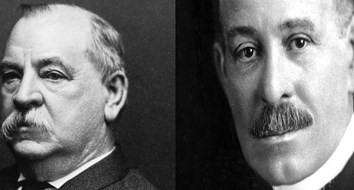Download:
The author would like to thank Diane Katz, director of science, environment, and technology policy at the Mackinac Center, for her assistance in the preparation of this column.
Few of us would understand the jargon employed in a recent ruling overturning telecommunications regulations issued by the Federal Communications Commission (FCC). But it’s not necessary to know what “UNE-P” means or how “hot cuts” are performed to take an interest in the proceedings. At stake are fundamental principles of interstate commerce and property rights.
Three times in the past eight years, federal courts have struck down as arbitrary and over-reaching prior versions of the FCC regulations governing competition in local telephone service. Three times the commission has been ordered to revise its autocratic rules. The latest incarnation of the regulations, unveiled last October and struck down on March 2, is in some respects the worst of the lot, as if the FCC were increasingly deaf to judicial censure.
It’s a troubling state of affairs for obvious reasons. Regulatory uncertainty has inhibited telecom investment and innovation, thereby eroding the reliability of the network as well as impeding economic growth. The commission’s intransigence, meanwhile, insults the separation-of-powers doctrine and exposes the telecom industry to regulatory abuse. It’s a case study of the government bull in the proverbial china shop.
The blame largely falls on Congress. Key elements of the 1996 Telecommunications Act decreed outcomes but not means, leaving the FCC to expand its regulatory empire. Indeed, the agency subsequently issued more than 10,000 pages of new rules, predictably unleashing a frenzy of litigation.
Ironically, the 1996 Act was intended as an instrument of reform. In a major departure from six decades of state and federal policy, Congress rightfully sought to end the monopoly franchise system in local phone calling. Unfortunately, lawmakers presumed that government could create a competitive market through regulation—a conceit that doomed their good intentions.
The most problematic aspect of the act is the requirement that major wire-line companies such as Verizon, BellSouth, SBC, and Qwest allow rival firms to use their networks at regulated rates. Such “forced access”—a regulatory taking of private property if ever there was one—was necessary, Congress reasoned, to allow new entrants to gain market share. Once their business base was established, competitors were expected to construct independent facilities.
The FCC devised a complex formula to set access rates based on the cost of operating a hypothetical network. The phantom network would presumably feature the most advanced technologies and operate at optimum efficiency.
Of course, no such network actually exists. And with no market confirmation of these hypothetical network costs, regulators set the access rates artificially low. Because the rates fail to cover operating costs in many instances, the network owners are effectively subsidizing their rivals.
Not surprisingly, the robust wire-line market envisioned by Congress has not materialized. Reliance on incumbent networks has largely failed to stimulate new products or services, or even lower rates—the hallmarks of competition. In essence, forced access has simply allowed new entrants to slap their names on existing services and call it competition. Most have no incentive to construct independent facilities. And faced with the prospect of having to “share” their facilities, many incumbents have been unwilling to undertake new investment.
Disappointing Results
In Michigan, for example, the Mackinac Center found that 89 percent of the local wire lines billed by competitors in 2002 actually were serviced in whole or in part by an incumbent network, up from 62 percent in 1999. Meanwhile, there has been a corresponding decline in the proportion of lines served by independent facilities. Competitors utilized their own facilities to service a mere 10 percent of their customers in 2002, down from 29 percent in 1999.
In short, the forced-access regime has failed to achieve its most basic policy goals. As stated by securities analysts with Fulcrum Global Partners LLC: “The fact that we are no closer to a deregulated market than we were in 1995 speaks volumes for how ineffective the law was in the first place. The incremental social burden that the Telecom Act of 1996 has placed upon the industry, consumers and the country overall cannot begin to be measured.” But bad as the economic consequences have been, the surrender of constitutional and market principles is worse. There can hardly be a more direct violation of the Fifth Amendment “takings” clause than the FCC’s regulatory declaration that “the incumbent must accept the novel use of, and modification to, its network facilities.” From the standpoint of network owners, the regulated access rates are downright confiscatory.
Proponents claim that the regulations are necessary to neutralize the monopoly advantages once enjoyed by incumbents. (So the FCC, which for 60 years preserved that monopoly system, is now the architect of reform?) But such regulatory punishment appears to conflict with the ex-post-facto clause of the Constitution, leaving us to wonder how our law-abiding actions today will be sanctioned by government sometime in the future.
The latest rewrite of the telecom rules also undermined the tenets of interstate commerce. The commission majority had directed 50 state utility commissions (and the District of Columbia) to determine which elements of the local telecom network should remain communal property. But as the U.S. Court of Appeals for the D.C. Circuit ruled in March, this delegation of authority represents a “fundamental misreading of the law.”
A handful of “conservative” lobbyists have attempted to argue that this delegation of regulatory authority to the states is proper from a federalist perspective. But interstate commerce is unquestionably the province of the federal government, and nothing so defines modern telecommunications as the absence of geographic boundaries.
It is worth noting that the most rapidly expanding sectors of the telecom industry—wireless and cable telephony—are the least regulated. As history has repeatedly shown, technological progress thrives in the absence of centralized authority. Both alternatives represent significant competitive challenges to local wire-line carriers—without subsidies or onerous regulation.
If we strip away the technical particulars that often cloud this policy debate, what we essentially are left with are disparate visions about the power of markets to maximize technological innovation. It is clear that the regulatory model has failed to achieve policy objectives.
All this is yet another reminder that deviating from time-tested principles of a free marketplace, property rights, and due process under constitutional rules carries costly consequences.





